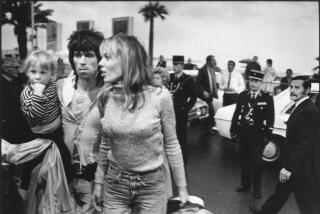‘Grace’: Turbulent Life of ‘60s Female Singer
If we can all agree, and we should, that it’s nearly impossible to dramatize American pop culture in the ‘60s without looking and sounding silly, then writer-director Allison Anders’ “Grace of My Heart” is a pretty good movie. Not as silly-looking as it might be, nowhere near as silly as it might have sounded.
Still, in telling the story of a singer-songwriter who goes from local contest winner to seminal rock ‘n’ roller, “Grace” does push its luck in the second hour, when it descends into rank melodrama and virtually morphs into another version of “A Star Is Born.”
Anders, following “Gas Food Lodging” and “Mi Vida Loca,” is once again exploring the struggles of a woman to find a place in a male-dominated society, but is doing it in epic style. “Grace” covers a decade in the life of Denise Waverly, nee Edna Buxton, of Philadelphia, whose musical career follows that of real-life rocker Carole King so closely, the reference is as pointless to debate as it is for the filmmakers to deny.
*
Anders needed an electrifying central performance to keep this thing from turning into golden oldies nostalgia, and she got it from Illeana Douglas. Best remembered for her roles as Robert De Niro’s victim in “Cape Fear” and the sister of Nicole Kidman’s victim in “To Die For,” Douglas controls “Grace” from the opening scenes, when Edna is winning a local talent contest, to the last, after a turbulent love life and a roller-coaster ride through early rock history.
The main setting for “Grace” is the famous Brill Building in Times Square, a song factory where from 1958 to 1970 young writers barely out of high school wrote hit after hit for artists recording right down the hall. Many of those writers wanted to become singers themselves, and some did. But few were women, and for Edna (and Carole King), it was a matter of writing and waiting.
“Grace” marvelously re-creates that atmosphere of sweatshop creativity, both the pressure and the joy, and Douglas’ portrayal of a woman fighting for her own identity and a piece of the action gives the story a solid emotional footing.
Edna, like Judy Garland’s Vicky Lester in “A Star Is Born,” is a strong, uncomplicated woman in a complicated business, and her basic decency sees her through some stormy relationships: one with an egocentric writing partner (Eric Stoltz), another with a married deejay (Bruce Davison).
There’s enough going on in this Brill period, certainly enough good music written for the soundtrack, to contain a whole movie, and Anders would have been wise to keep the story in New York. But she didn’t and when Edna heads for the psychedelic surfer scene in Southern California, where she marries mentally unstable rock idol Jay Phillips (Matt Dillon), “Grace” hits the jackpot in pop cliches.
Dillon is actually very good in a role that seems based as much on Norman Maine as Brian Wilson, but it occurs in a vacuum of melodrama, and every minute spent on the West Coast is, as they used to say, a bum trip. For Edna, and for us.
* MPAA rating: R, for language, and for some sexuality and drug content. Times guidelines: no nudity but lots of dirty words.
(BEGIN TEXT OF INFOBOX / INFOGRAPHIC)
‘Grace of My Heart’
Illeana Douglas: Edna Buxton/Denise Waverly
John Turturro: Joel Millner
Matt Dillon: Jay Phillips
Eric Stoltz: Howard Caszatt
Bruce Davison: John Murray
A Cappa Production, released by Gramercy Pictures. Director, screenplay Allison Anders. Producers Daniel Hassid, Ruth Charny. Editors Thelma Schoonmaker, James Kwei, Harvey Rosenstock. Cinematography Jean Yves Encoffier. Production design Francois Seguin. Composer Larry Klein. Costumes Susan Bertram. Running time, 1 hour, 55 minutes.
* At selected theaters throughout Southern California.
More to Read
Only good movies
Get the Indie Focus newsletter, Mark Olsen's weekly guide to the world of cinema.
You may occasionally receive promotional content from the Los Angeles Times.










